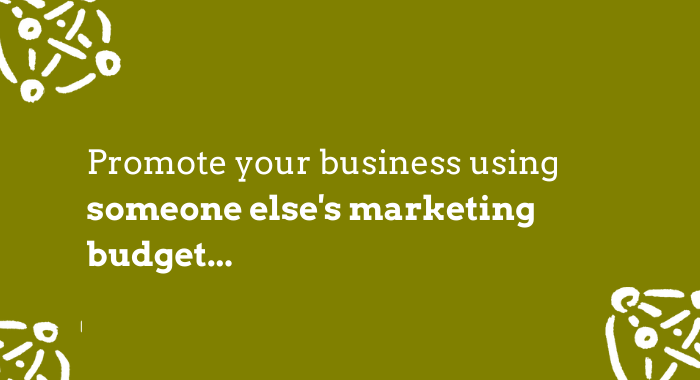Marketing using someone else's budget

When your marketing budget is limited, there's an easy way to add power to your promotions: piggyback. Piggyback marketing essentially means using someone else's marketing budget to benefit your business.
Obviously I don't mean actually using their money, but rather harnessing the power of their activity and piggybacking on the awareness they're able to create. It's a bit like riding in the slipstream of a more powerful vehicle.
Read on for some ideas for current trends you can easily piggyback
One part of piggyback marketing is to look at trends and what's happening in the wider world. You can create marketing around any emerging trends. Another option is to 'newsjack'. I think this latest term sounds a bit ominous so I still talk about piggyback marketing.
Every day there are news stories that everyone notices, TV programmes that people talk about, attention-grabbing book launches.
Newsjacking means taking a story or something that's getting a lot of interest, finding a connection to your business, and using it in your own marketing. Because people are already noticing that topic, they're more likely to connect with your story. So you're essentially able to benefit from their bigger promotional power and marketing budgets.
Finding a relevant news story isn't always easy so I like to use the same tactic but a different approach for tourism marketing: TV programmes, books and magazine articles. You could also take advantage of other current trends such as an increased interest in the environment, birdwatching and wholesome activities.
Whether you want to use news stories, popular TV programmes (for example, a programme that highlights walks in your area) or other angles, the starting point is to find good angles and spot trends.
Some ideas for trends and interest points you might be able to use in your own marketing
Social media is usually a good source of inspiration. I just spent under two minutes scrolling through twitter and came up with these themes:
- Plants (thanks to environmental interest and David Attenborough's Green Planet - do you have a lot of plants in your business? Someone nearby with a nursery or who does talks? Visitor attractions with plants?
- The Repair Shop seems to have enduring appeal, sparking interest in make-do-and-mind, antiques, stories behind objects
- Working form home - this doesn't have to necessarily mean working from our own home. If you have accommodation with a desk and decent wifi, you could provide off-season working from home breaks
- Nature and the environment - new and different angles to this theme are much sought after by journalists
- Rhubarb - now is the season for Yorkshire Rhubarb, which might prompt ideas connected to other seasonal food and specialities
- Queen's Platinum Jubilee celebration plans are now starting to gather pace - is there a connection you can use?
- Dog-friendly - during the lockdowns dog ownership spiralled, leading to strong demand for dog-friendly facilities. The opposite is also true: there's a demand for pet-free locations for those who don't like animals or are allergic
- When programmes like Bake Off or Sewing Bee are on TV, there's always more interest in these crafts. For example, you could create a Pudding Trail around your business when Bake Off is on
Ways to use trends and piggyback marketing
You can track key words and hashtags on social media, and set up Google Alerts. There are three key things to remember when you choose something to piggyback on:
1. it must be relevant to your business - you need to find a relevant connection that isn't too contrived. If it is contrived, humour is useful.
2. once you've found a topic or angle, you need to act quickly - it won't be relevant for ever
3. it must be appropriate - some things might be newsworthy but it's distasteful to use them
It's important to find something that will add value to your business, raising awareness of something that you already do. So for example, if you have accommodation in the countryside or organise walking tours, then piggybacking on a TV programme featuring walks make sense as it can help position your business as a good base for walkers.
The topic could be relevant to you because:
- of your location
- the story of your business or what you do
- something you offer related directly to the story or topic you've chosen
- some one in your business knows about that topic and can talk about it with genuine authority
- Once you've chosen your topic, think what you'd like to achieve. Do you have a particular call to action in mind? What are you going to get people to do? To look at a particular page on your website (that's directly relevant to this topic and mentions the TV programme for example)? Or to share with a friend?
Adapt your message, find a good relevant photo, use the right hashtags, fpost it on social media or include in a press release (you'll need to be quick to maintain relevance). If you use several social media channels, it's worth starting with the one that you're strongest on so you can get a better response. If nothing happens and no-one shares or reacts, it could be just down to timing or the image so it's often worth repeating at a different time. If you get a response, repeat on different social media channels and use adapted wording repeat at regular intervals.
Look out for other stories and posts about the topic you're posting on, and start to comment on them, or share them to get more attention, adding your own comments.
Don't forget to make it fast! Keep going for as long as people share and show interest but don't overdo it.


0 comments
Leave a comment